英语教学叙事范文10篇
- 格式:pdf
- 大小:14.81 KB
- 文档页数:9
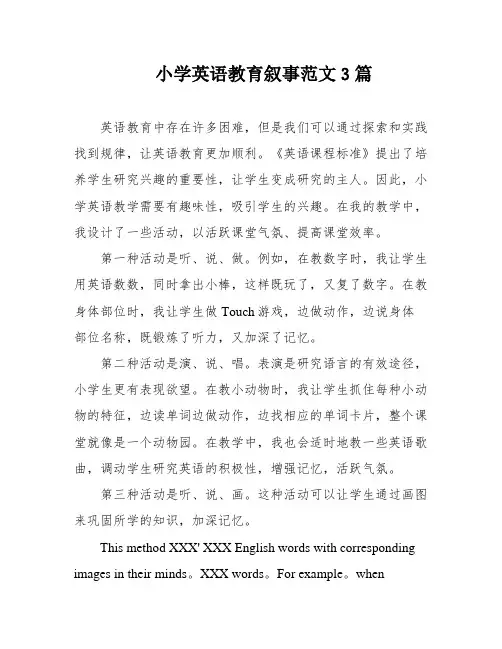
小学英语教育叙事范文3篇英语教育中存在许多困难,但是我们可以通过探索和实践找到规律,让英语教育更加顺利。
《英语课程标准》提出了培养学生研究兴趣的重要性,让学生变成研究的主人。
因此,小学英语教学需要有趣味性,吸引学生的兴趣。
在我的教学中,我设计了一些活动,以活跃课堂气氛、提高课堂效率。
第一种活动是听、说、做。
例如,在教数字时,我让学生用英语数数,同时拿出小棒,这样既玩了,又复了数字。
在教身体部位时,我让学生做Touch游戏,边做动作,边说身体部位名称,既锻炼了听力,又加深了记忆。
第二种活动是演、说、唱。
表演是研究语言的有效途径,小学生更有表现欲望。
在教小动物时,我让学生抓住每种小动物的特征,边读单词边做动作,边找相应的单词卡片,整个课堂就像是一个动物园。
在教学中,我也会适时地教一些英语歌曲,调动学生研究英语的积极性,增强记忆,活跃气氛。
第三种活动是听、说、画。
这种活动可以让学生通过画图来巩固所学的知识,加深记忆。
This method XXX' XXX English words with corresponding images in their minds。
XXX words。
For example。
whenlearning words that XXX such as hot。
cold。
rainy。
and windy。
guide students to use simple drawings to represent the meanings of the words。
For instance。
XXX。
carrying an XXX。
XXX branch represents windy。
wearing sunglasses represents sunny。
carrying an XXX。
etc。
Therefore。
XXX force for primary school students to love learning and be proficient in learning English。
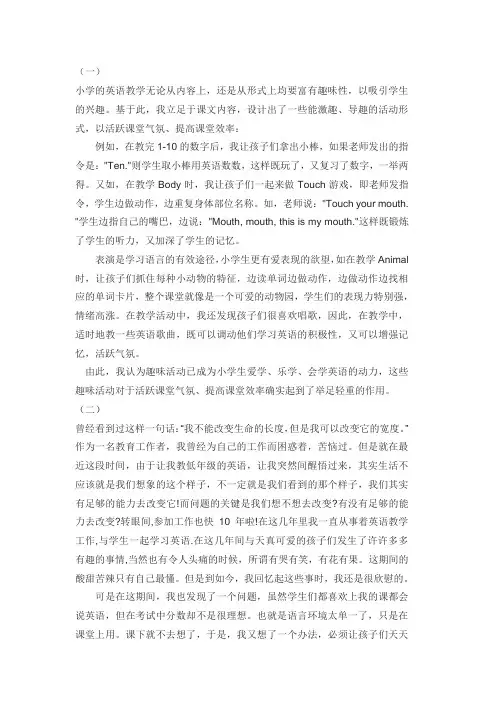
(一)小学的英语教学无论从内容上,还是从形式上均要富有趣味性,以吸引学生的兴趣。
基于此,我立足于课文内容,设计出了一些能激趣、导趣的活动形式,以活跃课堂气氛、提高课堂效率:例如,在教完1-10的数字后,我让孩子们拿出小棒,如果老师发出的指令是:"Ten."则学生取小棒用英语数数,这样既玩了,又复习了数字,一举两得。
又如,在教学Body时,我让孩子们一起来做Touch游戏,即老师发指令,学生边做动作,边重复身体部位名称。
如,老师说:"Touch your mouth. "学生边指自己的嘴巴,边说:"Mouth, mouth, this is my mouth."这样既锻炼了学生的听力,又加深了学生的记忆。
表演是学习语言的有效途径,小学生更有爱表现的欲望,如在教学Animal 时,让孩子们抓住每种小动物的特征,边读单词边做动作,边做动作边找相应的单词卡片,整个课堂就像是一个可爱的动物园,学生们的表现力特别强,情绪高涨。
在教学活动中,我还发现孩子们很喜欢唱歌,因此,在教学中,适时地教一些英语歌曲,既可以调动他们学习英语的积极性,又可以增强记忆,活跃气氛。
由此,我认为趣味活动已成为小学生爱学、乐学、会学英语的动力,这些趣味活动对于活跃课堂气氛、提高课堂效率确实起到了举足轻重的作用。
(二)曾经看到过这样一句话:“我不能改变生命的长度,但是我可以改变它的宽度。
”作为一名教育工作者,我曾经为自己的工作而困惑着,苦恼过。
但是就在最近这段时间,由于让我教低年级的英语,让我突然间醒悟过来,其实生活不应该就是我们想象的这个样子,不一定就是我们看到的那个样子,我们其实有足够的能力去改变它!而问题的关键是我们想不想去改变?有没有足够的能力去改变?转眼间,参加工作也快10年啦!在这几年里我一直从事着英语教学工作,与学生一起学习英语.在这几年间与天真可爱的孩子们发生了许许多多有趣的事情,当然也有令人头痛的时候,所谓有哭有笑,有花有果。
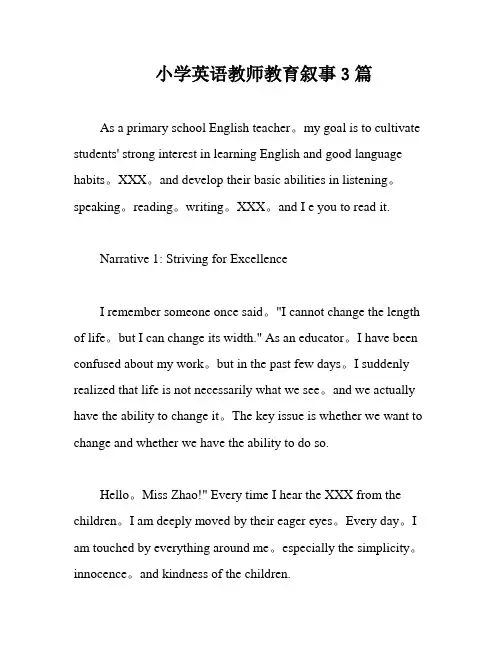
小学英语教师教育叙事3篇As a primary school English teacher。
my goal is to cultivate students' strong interest in learning English and good language habits。
XXX。
and develop their basic abilities in listening。
speaking。
reading。
writing。
XXX。
and I e you to read it.Narrative 1: Striving for ExcellenceI remember someone once said。
"I cannot change the length of life。
but I can change its width." As an educator。
I have been confused about my work。
but in the past few days。
I suddenly realized that life is not necessarily what we see。
and we actually have the ability to change it。
The key issue is whether we want to change and whether we have the ability to do so.Hello。
Miss Zhao!" Every time I hear the XXX from the children。
I am deeply moved by their eager eyes。
Every day。
I am touched by everything around me。
especially the simplicity。
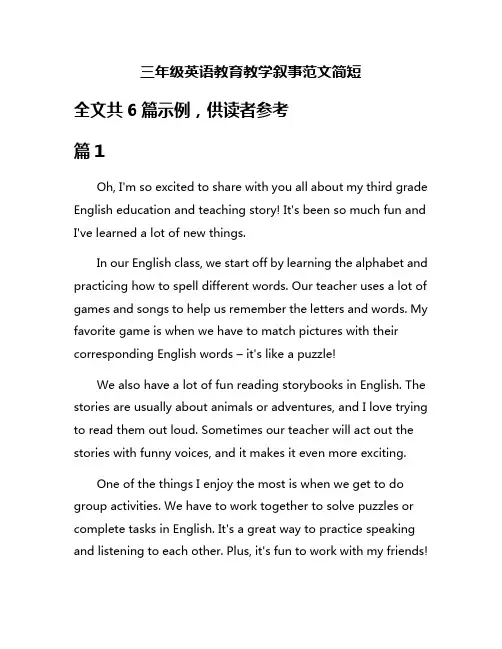
三年级英语教育教学叙事范文简短全文共6篇示例,供读者参考篇1Oh, I'm so excited to share with you all about my third grade English education and teaching story! It's been so much fun and I've learned a lot of new things.In our English class, we start off by learning the alphabet and practicing how to spell different words. Our teacher uses a lot of games and songs to help us remember the letters and words. My favorite game is when we have to match pictures with their corresponding English words – it's like a puzzle!We also have a lot of fun reading storybooks in English. The stories are usually about animals or adventures, and I love trying to read them out loud. Sometimes our teacher will act out the stories with funny voices, and it makes it even more exciting.One of the things I enjoy the most is when we get to do group activities. We have to work together to solve puzzles or complete tasks in English. It's a great way to practice speaking and listening to each other. Plus, it's fun to work with my friends!Every week, we have a spelling test to see how well we remember the words we've learned. It can be a little challenging, but I always try my best. And when I get a good grade, I feel so proud of myself!Overall, I've had a fantastic time learning English in third grade. It's been a lot of fun and I've learned so much. I can't wait to see what else we'll learn in the future!篇2Once upon a time, when I was in third grade, my English teacher, Mrs. Smith, taught us a really fun lesson about animals. She brought in pictures of different animals and asked us to describe them using English words. It was so exciting to learn new words like "tiger", "elephant", and "kangaroo".Mrs. Smith then gave us a project to create our own animal using paper, glue, and markers. I decided to make a purple unicorn with wings and a rainbow tail. It was the most magical creature ever! I named it Sparkle and wrote a short story about her adventures in a magical forest.After we finished our projects, Mrs. Smith asked us to present our animals to the class. I felt a little nervous at first, but my classmates cheered me on as I talked about Sparkle. Theyeven asked me questions about her, like what her favorite food was and where she liked to go on adventures.At the end of the lesson, Mrs. Smith told us that learning English can be fun and creative, just like making our own animals.I felt so proud of my unicorn and all the new words I had learned that day. I couldn't wait for the next English lesson with Mrs. Smith!That day, I realized that learning English is not just about memorizing words and grammar rules, but also about using your imagination and creativity to express yourself. Mrs. Smith showed us that English can be exciting and magical, just like my purple unicorn Sparkle. I will always remember that lesson and the joy of learning English in third grade.篇3In my third grade English class, we always have so much fun learning new things. Our teacher, Mrs. Smith, is the best teacher ever! She makes learning English easy and exciting for us.One day, Mrs. Smith decided to teach us about animals and their sounds. She showed us pictures of different animals like cows, ducks, and dogs, and then asked us to make the soundsthey make. It was hilarious hearing all my classmates try to sound like different animals!After that, Mrs. Smith introduced us to a fun game called "Animal Charades." She would act like an animal without making any sounds, and we had to guess what animal she was pretending to be. It was so much fun and helped us remember the sounds animals make.Another day, Mrs. Smith brought in a big map of the world and taught us about countries and their languages. We learned that people in China speak Chinese, people in France speak French, and people in Italy speak Italian. It was so interesting to learn about different languages and cultures from around the world.Mrs. Smith also taught us how to write short sentences in English. She would write a sentence on the board, and we had to read it out loud and then write it in our notebooks. We practiced writing sentences like "I like to play soccer" and "My favorite color is blue." It was a great way to improve our English writing skills.I really love my English class in third grade. Mrs. Smith makes learning fun and exciting, and I can't wait to learn more about the English language with her!篇4Once upon a time, in my third grade English class, my teacher, Miss Lily, taught us a fun new game to help us learn vocabulary words. It was called "Word Master".Miss Lily divided us into two teams, the Blue Team and the Red Team. Each team had to come up with as many words as possible using the letters of a given vocabulary word. For example, if the word was "apple", we could make words like "ape", "pal", and "leap".We all got so excited to play the game! The Blue Team went first and came up with lots of words like "pet", "lap", and "pea". Then it was the Red Team's turn, and they were determined to beat us. They came up with words like "tap", "let", and "pat". It was so much fun trying to think of new words and cheering on our teammates.After a few rounds, Miss Lily told us that the word for the next round was "friends". This was a bit tricky because it had so many letters, but we were up for the challenge. The Blue Team started off strong with words like "red", "end", and "send". The Red Team fought back with words like "den", "ends", and "fries".In the end, both teams did really well and learned lots of new words. Miss Lily praised us for our hard work and creativity. We were all so proud of ourselves and couldn't wait to play Word Master again in our next English class. Learning English was never so much fun!篇5One day in my third grade English class, our teacher, Miss Lily, told us we were going to have a special lesson. She brought out a big box filled with colorful flashcards, and we were all excited to see what was inside.Miss Lily explained that we were going to play a game called "Word Wall" to help us learn new words. She divided us into teams and gave each team a set of flashcards with different words on them. The words were all in English, and some of them were quite challenging for us.The game started, and each team took turns picking a flashcard and trying to guess what the word meant. We could use gestures, drawings, or even act out the word to help our teammates guess. It was so much fun watching our friends try to guess the words and laughing at their silly actions.As the game went on, we started to recognize more and more words. Miss Lily was so happy to see us learning and having fun at the same time. She praised us for our hard work and encouraged us to keep trying our best.By the end of the lesson, we had learned so many new words and had a great time playing "Word Wall". We couldn't wait to tell our parents about the game and show off our new vocabulary. Miss Lily was proud of us, and we were proud of ourselves for how much we had learned in just one class.I will always remember that day in third grade English class and how much fun we had playing "Word Wall". Miss Lily made learning English so enjoyable, and I can't wait for our next special lesson. Learning English is so much fun!篇6Oh! Hi everyone! I want to tell you about our awesome English class in third grade. Our teacher, Ms. Smith, is super cool and always makes learning fun.Every morning, we start with a fun English warm-up game. Sometimes we play "Simon Says" with English commands like "jump" and "clap." It's so much fun to act out the words in English!Ms. Smith also teaches us English songs and rhymes. We sing "The Alphabet Song" and "Twinkle, Twinkle Little Star" in English. It helps us remember the words better and it's really fun to sing along with our classmates.One day, we had a special English project where we had to create a mini storybook. We had to write a short story in English and draw pictures to go along with it. It was so much fun to work on our stories and share them with the class.Ms. Smith also uses flashcards and games to help us learn English words. We play matching games and quiz each other on the vocabulary words we've learned. It's a fun way to practice our English skills.I love English class because it's so much fun to learn a new language. Ms. Smith makes learning English exciting and I can't wait to see what other fun activities we'll do in class. English class is the best!。
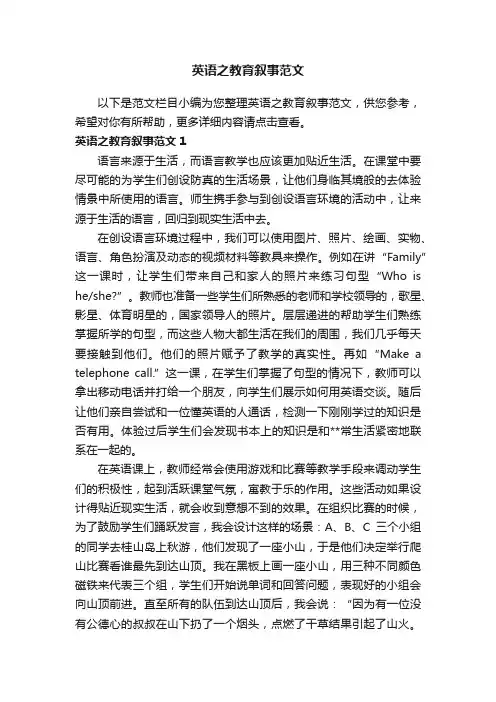
英语之教育叙事范文以下是范文栏目小编为您整理英语之教育叙事范文,供您参考,希望对你有所帮助,更多详细内容请点击查看。
英语之教育叙事范文1语言来源于生活,而语言教学也应该更加贴近生活。
在课堂中要尽可能的为学生们创设防真的生活场景,让他们身临其境般的去体验情景中所使用的语言。
师生携手参与到创设语言环境的活动中,让来源于生活的语言,回归到现实生活中去。
在创设语言环境过程中,我们可以使用图片、照片、绘画、实物、语言、角色扮演及动态的视频材料等教具来操作。
例如在讲“Family”这一课时,让学生们带来自己和家人的照片来练习句型“Who is he/she?”。
教师也准备一些学生们所熟悉的老师和学校领导的,歌星、影星、体育明星的,国家领导人的照片。
层层递进的帮助学生们熟练掌握所学的句型,而这些人物大都生活在我们的周围,我们几乎每天要接触到他们。
他们的照片赋予了教学的真实性。
再如“Make a telephone call.”这一课,在学生们掌握了句型的情况下,教师可以拿出移动电话并打给一个朋友,向学生们展示如何用英语交谈。
随后让他们亲自尝试和一位懂英语的人通话,检测一下刚刚学过的知识是否有用。
体验过后学生们会发现书本上的知识是和**常生活紧密地联系在一起的。
在英语课上,教师经常会使用游戏和比赛等教学手段来调动学生们的积极性,起到活跃课堂气氛,寓教于乐的作用。
这些活动如果设计得贴近现实生活,就会收到意想不到的效果。
在组织比赛的时候,为了鼓励学生们踊跃发言,我会设计这样的场景:A、B、C三个小组的同学去桂山岛上秋游,他们发现了一座小山,于是他们决定举行爬山比赛看谁最先到达山顶。
我在黑板上画一座小山,用三种不同颜色磁铁来代表三个组,学生们开始说单词和回答问题,表现好的小组会向山顶前进。
直至所有的队伍到达山顶后,我会说:“因为有一位没有公德心的叔叔在山下扔了一个烟头,点燃了干草结果引起了山火。
现在火势凶猛,已经无法下山了。
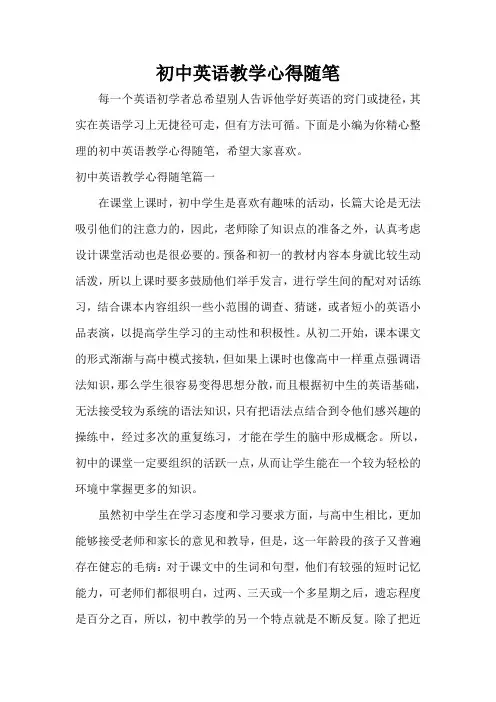
初中英语教学心得随笔每一个英语初学者总希望别人告诉他学好英语的窍门或捷径,其实在英语学习上无捷径可走,但有方法可循。
下面是小编为你精心整理的初中英语教学心得随笔,希望大家喜欢。
初中英语教学心得随笔篇一在课堂上课时,初中学生是喜欢有趣味的活动,长篇大论是无法吸引他们的注意力的,因此,老师除了知识点的准备之外,认真考虑设计课堂活动也是很必要的。
预备和初一的教材内容本身就比较生动活泼,所以上课时要多鼓励他们举手发言,进行学生间的配对对话练习,结合课本内容组织一些小范围的调查、猜谜,或者短小的英语小品表演,以提高学生学习的主动性和积极性。
从初二开始,课本课文的形式渐渐与高中模式接轨,但如果上课时也像高中一样重点强调语法知识,那么学生很容易变得思想分散,而且根据初中生的英语基础,无法接受较为系统的语法知识,只有把语法点结合到令他们感兴趣的操练中,经过多次的重复练习,才能在学生的脑中形成概念。
所以,初中的课堂一定要组织的活跃一点,从而让学生能在一个较为轻松的环境中掌握更多的知识。
虽然初中学生在学习态度和学习要求方面,与高中生相比,更加能够接受老师和家长的意见和教导,但是,这一年龄段的孩子又普遍存在健忘的毛病:对于课文中的生词和句型,他们有较强的短时记忆能力,可老师们都很明白,过两、三天或一个多星期之后,遗忘程度是百分之百,所以,初中教学的另一个特点就是不断反复。
除了把近期所学的课本内容反反复复的通过默写、背诵进行强化之外,在新知识的教授同时,把以往几个学期里所学过的知识点在课堂里有机的结合,进行书面和笔头的训练也是很有必要的。
校内除了期中、期末两次综合性的测试之外,每月组织的月考在一定程度上帮助老师能及时了解学生的知识掌握程度,尤其对初中学生而言,题目难度可以不大,但是重要的知识点的重复出现能帮助学生加强长久记忆。
此外,定期进行单词测试也是有效的手段之一,以此督促学生养成经常温习所学过的词汇的好习惯。
在初中上课还有一个关键点便是如何把握课堂的纪律问题。
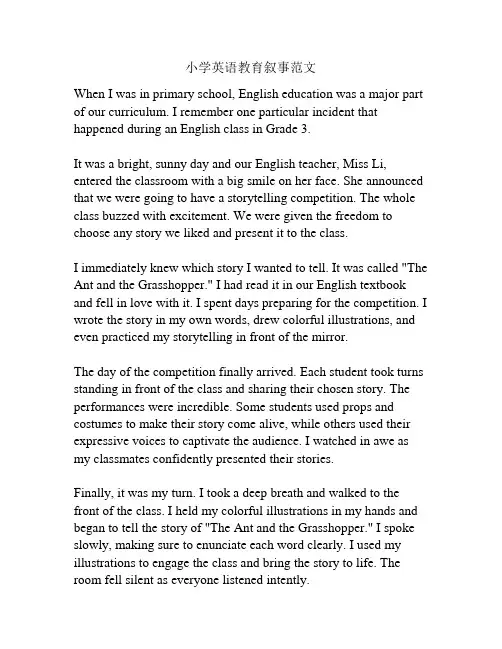
小学英语教育叙事范文When I was in primary school, English education was a major part of our curriculum. I remember one particular incident that happened during an English class in Grade 3.It was a bright, sunny day and our English teacher, Miss Li, entered the classroom with a big smile on her face. She announced that we were going to have a storytelling competition. The whole class buzzed with excitement. We were given the freedom to choose any story we liked and present it to the class.I immediately knew which story I wanted to tell. It was called "The Ant and the Grasshopper." I had read it in our English textbook and fell in love with it. I spent days preparing for the competition. I wrote the story in my own words, drew colorful illustrations, and even practiced my storytelling in front of the mirror.The day of the competition finally arrived. Each student took turns standing in front of the class and sharing their chosen story. The performances were incredible. Some students used props and costumes to make their story come alive, while others used their expressive voices to captivate the audience. I watched in awe as my classmates confidently presented their stories.Finally, it was my turn. I took a deep breath and walked to the front of the class. I held my colorful illustrations in my hands and began to tell the story of "The Ant and the Grasshopper." I spoke slowly, making sure to enunciate each word clearly. I used my illustrations to engage the class and bring the story to life. The room fell silent as everyone listened intently.When I finished my presentation, the class erupted into applause. Miss Li had a big smile on her face as she praised my efforts. She said that my storytelling skills were excellent and encouraged me to continue practicing English.That day, I learned the power of storytelling and the impact it can have on an audience. It gave me the confidence to express myself in English and motivated me to become better at the language. From then on, I became more actively involved in English classes and participated in various speaking competitions.Looking back, I am grateful for that storytelling competition in primary school. It not only improved my English skills but also sparked a love for storytelling that continues to this day. The experience taught me the importance of effective communication and the joy of sharing stories with others.。
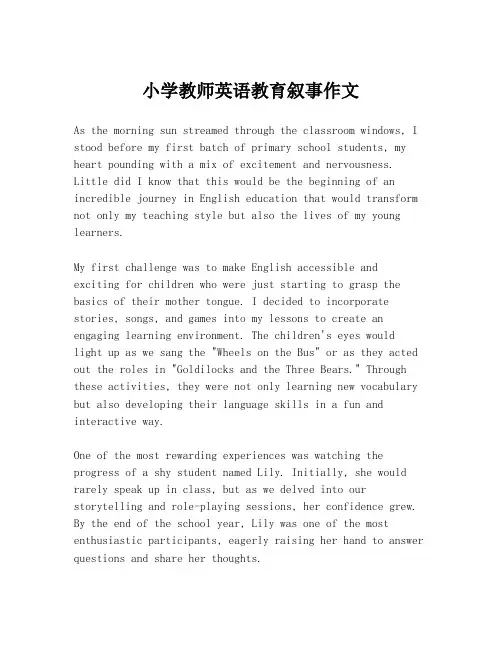
小学教师英语教育叙事作文As the morning sun streamed through the classroom windows, I stood before my first batch of primary school students, my heart pounding with a mix of excitement and nervousness.Little did I know that this would be the beginning of an incredible journey in English education that would transform not only my teaching style but also the lives of my young learners.My first challenge was to make English accessible andexciting for children who were just starting to grasp the basics of their mother tongue. I decided to incorporate stories, songs, and games into my lessons to create an engaging learning environment. The children's eyes wouldlight up as we sang the "Wheels on the Bus" or as they acted out the roles in "Goldilocks and the Three Bears." Through these activities, they were not only learning new vocabulary but also developing their language skills in a fun and interactive way.One of the most rewarding experiences was watching the progress of a shy student named Lily. Initially, she would rarely speak up in class, but as we delved into our storytelling and role-playing sessions, her confidence grew. By the end of the school year, Lily was one of the most enthusiastic participants, eagerly raising her hand to answer questions and share her thoughts.Another pivotal moment in my teaching journey was when I introduced a pen pal program with a school in another country. This not only improved the students' writing skills but also broadened their cultural horizons. The excitement waspalpable as they exchanged letters, learning about new places, customs, and making friends across the globe.However, the journey was not without its challenges. There were days when maintaining discipline felt like an uphill battle, and there were times when I questioned my methods.But the breakthroughs and the "aha" moments from my students made every struggle worthwhile.Over the years, I've learned the importance of patience, creativity, and adaptability in teaching. Each child is unique, and it's my job to cater to their individual learning styles and needs. I've also come to appreciate the power of encouragement and positive reinforcement in fostering a love for learning.In conclusion, my narrative as a primary school Englishteacher is one of growth, both for my students and myself.It's a story of overcoming obstacles, celebrating successes, and most importantly, the joy of watching young minds blossom as they embrace the world of English language and literature.。
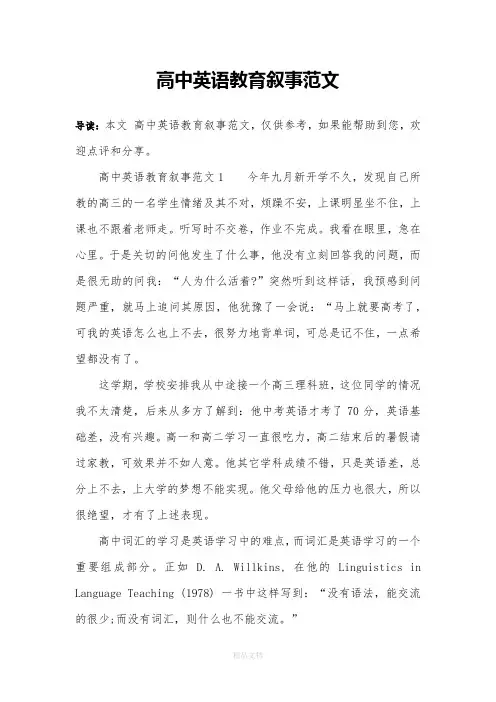
高中英语教育叙事范文导读:本文高中英语教育叙事范文,仅供参考,如果能帮助到您,欢迎点评和分享。
高中英语教育叙事范文1 今年九月新开学不久,发现自己所教的高三的一名学生情绪及其不对,烦躁不安,上课明显坐不住,上课也不跟着老师走。
听写时不交卷,作业不完成。
我看在眼里,急在心里。
于是关切的问他发生了什么事,他没有立刻回答我的问题,而是很无助的问我:“人为什么活着?”突然听到这样话,我预感到问题严重,就马上追问其原因,他犹豫了一会说:“马上就要高考了,可我的英语怎么也上不去,很努力地背单词,可总是记不住,一点希望都没有了。
这学期,学校安排我从中途接一个高三理科班,这位同学的情况我不太清楚,后来从多方了解到:他中考英语才考了70分,英语基础差,没有兴趣。
高一和高二学习一直很吃力,高二结束后的暑假请过家教,可效果并不如人意。
他其它学科成绩不错,只是英语差,总分上不去,上大学的梦想不能实现。
他父母给他的压力也很大,所以很绝望,才有了上述表现。
高中词汇的学习是英语学习中的难点,而词汇是英语学习的一个重要组成部分。
正如 D. A. Willkins, 在他的 Linguistics in Language Teaching (1978) 一书中这样写到:“没有语法,能交流的很少;而没有词汇,则什么也不能交流。
”鉴于此,我感觉自己有责任很重,想一定要帮助孩子攻克单词难关,帮助他提高英语成绩。
首先,我给他介绍一些简单、重要且实用的音标知识;第二,教他一些实用的构词法。
第三,帮助他从高考大纲3000词汇中挑出1000个重点词汇,并把它们按词性分类,标出中文意思,同时告诉他哪些是作文词汇,哪些是应用文词汇。
第四,怎样通过上下文猜汇。
除此之外,最重要的是鼓励他,让他有自信做好这件事。
这样他坚持了半个月,强化背单词,他变得不再绝望,对自己充满信心。
真心祝愿他三个月之后的高考中,能很好发挥,实现人生的理想和目标。
高中阶段的词汇教学一直耗时多,收效低。

第1篇一、背景介绍在我国,英语作为一门重要的外语,从小学习英语对孩子的未来发展具有重要意义。
然而,对于小学生来说,英语学习往往面临着词汇量不足、语法规则复杂、发音困难等问题。
为了帮助孩子们更好地学习英语,我在教学实践中尝试了一种以学生为主体的教学方法,通过创设情境、激发兴趣、注重实践等方式,让孩子们在轻松愉快的氛围中掌握英语知识。
二、案例描述1. 学生情况分析小王是我班的一名学生,他性格开朗,但英语成绩一直处于班级中下游。
在学习英语时,他总是感到困难重重,对英语学习缺乏信心。
经过观察,我发现他在学习英语时存在以下问题:(1)词汇量不足,无法准确理解课文内容;(2)语法知识掌握不牢固,导致句子结构错误;(3)发音不准确,影响听力理解。
2. 教学目标设定针对小王的学习情况,我设定了以下教学目标:(1)帮助学生扩大词汇量,提高阅读理解能力;(2)帮助学生掌握基本的语法知识,提高写作能力;(3)帮助学生纠正发音,提高听力理解能力。
3. 教学过程为了实现上述教学目标,我采用了以下教学方法:(1)创设情境,激发兴趣在课堂教学中,我通过播放英语歌曲、观看英语动画片、开展角色扮演等活动,将枯燥的英语知识融入到生动有趣的情境中,激发学生的学习兴趣。
例如,在学习“My family”这一单元时,我组织学生进行家庭角色扮演,让他们用英语介绍自己的家庭成员,从而提高他们的口语表达能力。
(2)注重实践,提高应用能力在课堂练习环节,我设计了丰富的实践活动,如单词接龙、句子填空、看图说话等,让学生在实践中巩固所学知识。
同时,我还鼓励学生将所学英语知识应用到日常生活中,如用英语问候、介绍自己等。
(3)个别辅导,关注学生差异针对小王的学习情况,我进行了个别辅导。
在辅导过程中,我耐心纠正他的发音,帮助他掌握语法知识,并鼓励他多阅读、多听、多说、多写,提高英语综合运用能力。
4. 教学效果评价经过一段时间的努力,小王的英语成绩有了显著提高。
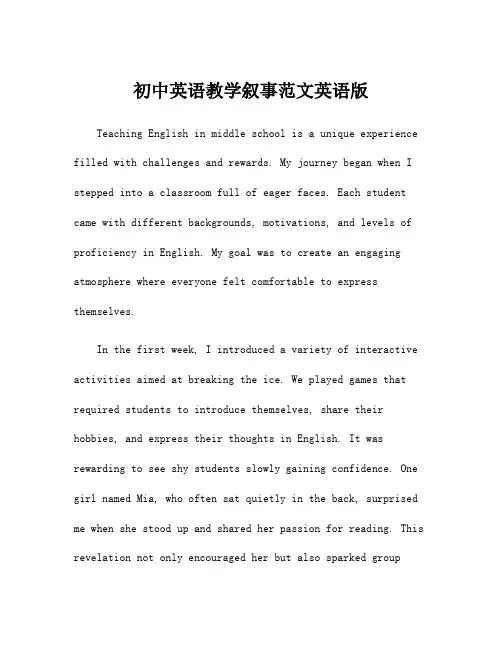
初中英语教学叙事范文英语版Teaching English in middle school is a unique experience filled with challenges and rewards. My journey began when I stepped into a classroom full of eager faces. Each student came with different backgrounds, motivations, and levels of proficiency in English. My goal was to create an engaging atmosphere where everyone felt comfortable to express themselves.In the first week, I introduced a variety of interactive activities aimed at breaking the ice. We played games that required students to introduce themselves, share their hobbies, and express their thoughts in English. It was rewarding to see shy students slowly gaining confidence. One girl named Mia, who often sat quietly in the back, surprised me when she stood up and shared her passion for reading. This revelation not only encouraged her but also sparked groupdiscussions about favorite books, allowing other students to join in and speak up.As weeks passed, I incorporated storytelling and role-playing into the lessons. I found that using stories not only enhanced vocabulary but also improved comprehension skills. Students were asked to create their own short stories, which we later acted out in class. Watching them embody various characters gave them a sense of ownership over their learning. One day, during a role-playing activity, a boy named Liamtook on the role of a detective in a mystery story he had crafted. His enthusiasm and creativity captivated the entire class, making learning feel alive and relevant.Technology also played a crucial role in my teaching strategy. I introduced digital resources, such as interactive quizzes and language learning apps, to make lessons dynamic. This integration of technology kept students engaged, andthey often worked collaboratively on projects. I noticed thatthose who struggled with written assignments thrived in group settings, as they benefited from peer support.Assessing progress became an ongoing dialogue rather than a one-time event. Regular feedback sessions with students encouraged them to set personal learning goals. For instance, a student named Kevin expressed his desire to be more fluent in speaking. Together, we devised a plan that included daily speaking exercises and peer discussions. Over time, I watched as his confidence grew, and he eventually became one of the most active participants in class.Reflecting on that school year, I realize that teaching English is not just about grammar and vocabulary. It is about fostering a community where students can explore their creativity, build confidence, and develop a love for the language. Each student’s story adds depth to the tapestry of learning. As an educator, I cherish the moments when theyrealize that they are not just learning English; they are finding their voices in a new language.。
英语学科教学叙事一堂听力课的启发胡玉娟在高二的日常教学,我渐渐发现学生们对听力课的兴趣不再象高一时那样浓厚了,其间经常会有学生溜号或忙于做题。
这使我开始有了进一步的思考。
在多年的教学中,我一直认为兴趣是学好语言的强劲动力和能力形成的前提,我一直在教学中实践着努力培养学生的学习热情,包括平时大家都认为比较枯燥的语法。
在听力教学中,我也发现,只有使学生对所学的听力材料产生兴趣,才能调动他们的积极性。
学生有了学习的积极性,才会主动参与到听力训练中,从而提高教学效率,最终达到最佳的教学效果。
语言学家、心理学家的研究也表明,文化背景知识在听力训练中起着非常重要的作用。
可见,在做听力练习前,适当介绍一些与课文相关的背景知识,会更加有助于学生对听力材料的理解。
因此,在接下来的一个听力材料中,为了提高学生对所学材料的兴趣,我进行了精心的设计,我首先在黑板上呈现该课标题“living with disease”,并向学生出示了以下讨论题:How much do you know about disease? 要求学生根据题目进行小组讨论,预测一下本文将会谈到些什么,然后,我将课前准备好的有关disease的图片一一向学生呈现,从而使学生接触到一些具体disease的素材,为接下来的听力训练做好铺垫。
在听力过程中,我将翻录到电脑上的录音进行播放,同时在电脑屏幕上相应呈现图像剪辑,使学生不仅在听觉,而且在视觉上都能受到刺激,加深对听力材料的理解。
由于听力训练的目的是要尽力抓住主要内容,而不是细枝末节,因此,我并不要求学生把每个词、每句话都听懂,而是要求他们首先从整体上把握。
我把这个步骤分为两步:首先,播放整篇听力材料,要求学生尽力抓住主要内容,同时在听的过程中将这些内容与自己听前所做的预测进行比较,从而达到进一步理解的效果。
听完后完成相应的练习。
其次,进行逐段播放,在每段结束时留出1~2分钟的时间给学生思考,并要求他们完成第二和第三大题。
As an English teacher in a primary school,my days are filled with the laughter and curiosity of young learners.The narrative of my teaching journey is a mosaic of moments that shape the future of these young minds.Here is a glimpse into my world of teaching English to primary school students.The Morning Routine:Every day begins with the sound of childrens footsteps echoing in the hallways,a symphony of chatter and laughter.As they enter the classroom,their eyes are filled with anticipation for the days lessons.My role is to set the tone for learning,often starting with a warm greeting and a quick review of the previous days content.Interactive Lessons:The heart of my teaching lies in making English accessible and enjoyable.I use a variety of methods to engage my students.Interactive whiteboards are a favorite,allowing students to participate directly in the lesson.We might play word games,solve puzzles, or even create simple sentences together.The use of technology,such as educational apps and online resources,has been a gamechanger,making learning interactive and fun.Storytelling Sessions:Language is best learned through stories,and I ensure that storytelling is a staple in my classroom.We read a variety of books,from classic tales to contemporary stories,and discuss the characters,settings,and morals.This not only improves their reading comprehension but also encourages them to think critically and express their thoughts in English.Phonics and Spelling:A strong foundation in phonics is crucial for young learners.I dedicate time to teaching the sounds of the alphabet and how they blend to form words.Spelling bees and word searches are popular activities that reinforce these skills.The competitive nature of these activities often motivates students to practice their spelling outside of class.Cultural Exposure:Language is deeply intertwined with culture,and I strive to expose my students to different cultural aspects through English.We celebrate holidays from around the world, learn about different cuisines,and even engage in simple conversations in English about their favorite activities.This not only enriches their language skills but also fosters a sense of global citizenship.Assessment and Feedback:Regular assessments are essential to gauge students progress and identify areas that needimprovement.I use a mix of formal tests and informal observations to assess their language skills.Feedback is given in a constructive manner,focusing on their strengths and areas for development.This helps students to understand their learning journey and sets clear goals for improvement.Parental Involvement:The role of parents in a childs education cannot be overstated.I maintain open communication with parents,updating them on their childs progress and providing tips on how they can support their childs English learning at home.This collaborative approach ensures that the learning extends beyond the classroom.Reflection and Continuous Learning:At the end of each day,I take time to reflect on the lessons taught and the students responses.This reflection helps me to adapt my teaching methods to better suit the needs of my students.As an educator,I am also a lifelong learner,constantly seeking to improve my own language skills and teaching techniques.Teaching English to primary school students is a rewarding yet challenging endeavor.It requires patience,creativity,and a genuine passion for language.Each day is a new opportunity to inspire young minds and ignite a love for learning that will last a lifetime.。
初中英语教育叙事初中英语教育叙事(一)临近中考,三年1班的丁小辉同学在第一次模考的测验中仅得了九十多分,他接到卷子后随手揉乱了扔到书桌里。
这一情景恰巧被我注意到,当时我很生气,于是我把他叫到教室外面询问原因,他理直气壮地说:“我英语基础太差,跟不上了!” 由于他的语气不好,我把他训斥了一顿,他哭了,哭得很伤心,我问他有什么理由这么伤心,他说:“我这样做不是针对老师,只是很痛恨自己怎么这么不争气。
”就在这一瞬间,我感到我面前站着的这个孩子有很强的自尊心,也意识到自己这种冲动的大声斥责可能是徒劳无益的,同时,我内心产生了一种慈爱之心。
于是,我先让他面对墙壁哭个够,免得被别的同学看见,然后让他把眼泪擦干,说道:“你考不好知道生气,说明你很要强。
其实你的英语在班里算上很不错了?最近是不是压力太大了呀?” 他点点头。
于是我开始指导他如何克服考前压力,如何最快地取得进步,我从英语的语言特点到英语学习的重要性,到学习方法,一一向他做了介绍,并根据他的实际情况给他留了每天的学习任务,还一再鼓励他,最后,他非常感激地回到教室。
接下来的几天,我始终注意观察他的听课状态,发现他不再向前些天那样闷闷不乐,而是非常积极的参加各项活动。
一天放学后,我走到二楼楼梯口,他主动走向我说:“老师,我按照你说的去做,果然在各门课上都有了进步。
” 我说:“只要你有撇开中考负担,尽你所能去学,你一定能行。
”在下次的测验中,他考了一百二十多分,我主动找到他,给他分析试卷失分的原因。
又鼓励他说:“看,你其实是很棒的,相信你自己,中考你就一定能考好,中考的题目比这次的简单多了。
”他摸摸后脑勺,笑了。
中考满分150分,他顺利取得了130分的好成绩,这对他,一个在考前情绪低落,缺乏自信的学生来说,能走出困境是多么的不易啊!我对他的认真、执着从内心感到高兴,我与他共同分享着成功的喜悦。
关键的不是他的分数,而是在我为人师的过程中,对我的付出的回报。
更使我认识到教师的言传身教,对学生的影响是多么的重要。
英语教育叙事范文English Education NarrationI have always been fascinated by the English language. Its elegance and precision have intrigued me since I was a child. However, my journey with English education has not always been smooth sailing.When I started learning English in school, I struggled to grasp even the basics. The strange sounds and unfamiliar grammar rules overwhelmed me. I felt as if I was drowning in a sea of words, unable to make sense of the vast ocean of vocabulary.Determined not to give up, I sought additional help outside of the classroom. I enrolled in an English language course, where I met a passionate and dedicated teacher. She believed in my potential and encouraged me to work hard. With her guidance, I made steady progress. From memorizing simple phrases to forming complex sentences, I could feel my confidence growing.But just as I was starting to feel comfortable with the language, I faced another hurdle. The dreaded listening tests. Accents from different parts of the English-speaking world perplexed me. I could understand my teacher, but when it came to native speakers or even non-native speakers with different accents, I struggled to comprehend their words. It was as if they were speaking an entirely different language.Determined not to be defeated, I turned to music and movies as tools to improve my listening skills. I listened to songs andwatched movies with English subtitles. I sang along to the lyrics and mimicked the actors' accents and intonation. Slowly but surely, my ears became attuned to the nuances of the English language. I could pick up on subtle differences in pronunciation and understand the meaning behind the words.As my proficiency in English grew, so did my thirst for knowledge.I became an avid reader, immersing myself in English literature. The works of renowned authors transported me to different worlds and expanded my horizons. I fell in love with the power of words and the beauty of storytelling.English education has taught me more than just the technical aspects of the language. It has taught me perseverance, resilience, and the importance of continuous learning. It has opened doors for me, allowing me to connect with people from different cultures and backgrounds.Now, years later, I find myself standing in front of a classroom as an English teacher. I hope to inspire my students like my teacher once inspired me. I want to instill in them the love for the English language and the confidence to communicate effectively.English education is not just about mastering grammar and vocabulary. It is about unlocking the power of language and using it as a tool for communication and understanding. It is a journey that never truly ends, as there is always more to learn and discover.。
初中英语教育叙事——鼓励的力量“Who can tell me about your techniques for learning English?”学习Some Techniques for learning English一课时我这样问学生。
学生都踊跃举手,争先恐后地想要发表意见,这时候在教室的角落,我看到一个小男生畏畏缩缩地,流露出想举手却又很害怕的神情。
是王*,他从来不在英语课上发言,成绩也很差。
我微笑着看着他:“Would you like to try?”他缓缓地站起来,小声地用一口流利的英语说道:“To learn English well, we should listen carefully in class and make notes, and do homework at home.”所有学生都惊了,教室很安静。
“Very good! Try again, please speak louder!”于是他又说了一遍,声音很大很流利。
一阵沉默之后,我听到了一片热烈的掌声,那是肯定的掌声,尊重的掌声,发自内心的掌声。
他脸红了,有点不好意思了,不停地挠着头。
而我趁热打铁,对他的表现表扬了一番。
在后面的十几分钟里,我组织学生小组谈论并写下自己的特色学习方法。
我发现王*和同学讨论积极,而且观点鲜明,在同学的帮助下他写下了很多自己的英语学习方法。
最后在展示学习成果时,他第一个举手,而且说得非常流利,所谈方法也得到了同学们的一致肯定和赞赏。
最后由于王*的突出表现,全班同学一致通过奖励给王*一枚奖牌。
下课后,走出教室,我暗自高兴:作为英语老师,看到一个英语学困生有这样的表现,这无疑让我对今后的英语教学充满了信心。
但是我又转念一想,表面上看起来王*本节课表现确实不错,但回想起他平时的表现及每次的英语成绩,我又担心这会不会只是表面现象,他会不会只是三分钟热度呢?其实以前这样的例子还真不少。
小学英语故事教学作为一名英语老师,要面对很多不同的学生,所以,在教学中一定有很多的趣事发生吧,以下是小编精心准备小学英语教育叙事案例,欢迎大家一起来看看!
小学英语教育叙事案例一小学英语课程应从培养学生的学习兴趣入手,最大限度地发挥学生的潜在能力,使学生积极主动地参与学习的全过程,让学生由被动学转为主动学,从中真实感受学习的快乐。英语教学要照顾到小学生的年龄特点。这就要求小学的英语教学无论从内容上,还是从形式上均要富有趣味性,以吸引学生的兴趣。一、听听、说说、做做。例如,在教完1-10的数字后,我让孩子们伸出手,如果老师发出的指令是:"Ten."则学生用手势表示10,这样既玩了,又复习了数字,一举两得。又如,在教学五官词语时,我让孩子们一起来做Touch游戏,即老师发指令,学生边做动作,边重复身体部位名称。如,老师说:"Touchyourmouth."学生边指自己的嘴巴,边说:"Mouth,mouth,thisismymouth."这样既锻炼了学生的听力,又加深了学生的记忆。二、演演、说说、唱唱。表演是学习语言的有效途径,小学生更有爱表现的欲望,如在教学Let’splayfootball.时,让孩子们抓住每种球---篮球和足球的特征,边读单词边做动作,边做动作边找相应的单词卡片,整个课堂非常活跃,学生们的表现力特别强,情绪高涨。在教学活动中,我还发现孩子们很喜欢唱歌,因此,在教学中,适时地教一些英语歌曲,既可以调动他们学习英语的积极性,又可以增强记忆,活跃气氛。但是,凡事皆有度,趣味活动也不是万能的,如果教师把握不好时机和深度,那么有时反而会使教学步入误区。例如,我遇见一个学生,听说他刚开始学英语,就问他:"小猫用英语怎么说?"他回答:"小花猫,喵喵喵,catcat是小猫。"我又问他:"苹果怎么说?"他说:"苹果是apple,apple,apple是苹果。"对他而言,小猫、苹果的英语单词和汉语是一个整体,每次他都必须经过儿歌这段思维才能想起英文单词。还有,老师常常爱把要学的英语句子编成歌曲教给孩子们唱,这种形式学生很喜欢,可是有的时候单词的发音会因为单纯迎合歌曲的调子而被扭曲,由此导致学生发音不准,反而收不到好的效果。所以我认为,我们在提高课堂趣味性的同时,一定要把握好时机和方法,让孩子们既学到正确无误的语音、单词和句子,又体验到学习的快乐。小学英语教育叙事案例二教学几年来,在英语课堂教学中总是觉得学生对英语学习不感兴趣,究其原因是因为学英语需要及大量的单词太乏味太辛苦了,英语教育叙事故事。是的背英语单词是很辛苦,但是如果我们能把它变得interesting了是不是可以改变这种状态呢。带着这种想法,我最近在课堂教学中做了一点尝试,一次在教高二选修7第三单元生词时遇到particularly这个单词教了好几遍学生就是读不下来,总是有相当一部分学生有问题,我突然想到最近我正在学习研究单词速记法就说:“谁能想一个好办法把这个单词记住?”过了几秒钟,有一个学生小声地说了什么,我隐隐约约听到好像是说这个单词的,于是我就叫他起来说,于是这个学生就大声说:“party可以有你了。”我一听,非常高兴地说:“Verygood!…”经过讨论最后确定为:“Party上可以有你了就特别了。”这样一来,即解决了读音问题又和词义有了联系,由于内容很形象所以增加了趣味性,因此就便于记忆了,这样一来课堂就活跃了起来。看到学生这样兴奋,我顺便讲了一些记忆方面的知识,以期能起到画龙点睛的作用。能让学生轻松地学习,这也是课标对教学的要求。既然大多数学生记忆英语单词有困难,为什么我们不能给他们教一些记忆方法呢。大脑,这个遍布沟回的神秘领域,普通人穷其一生能用到的却不过百分之一二;开发大脑,挖掘大脑潜能,已经成为全人类的一个梦想。在国外,脑力运动早已兴起,由英国人“大脑先生”托尼?波赞发起的世界记忆力锦标赛更是风行十余年,成为全球最权威的记忆力赛事。而在中国,这个领域几乎一片空白。还好近几年来速记在我国已经越来越被关注,记忆方面的书籍也如雨后春笋层出不穷,张杰。王茂华等记忆大师也进入了世界记忆大赛的前十名行列。填补了世界记忆领域无中国人的空白。下面就给大家介绍国内外记忆专家的一些理论、经验和建议。这些都是他们对快速记忆、提高记忆力和记忆的奥秘等经过多年研究而得出的结论。记忆法简单来说就是能够缩短我们记忆和回忆过程的技艺和技巧,包括我们常用的定桩法、地点法等等。记忆法一般都植根于一种理念,即大脑容易记住直观的、图像的、对感观冲击力大的事物,因此只要我们将要记的内容与这些东西联系起来,就很容易记住,且十分清晰,不易遗忘。记忆过程中有两个要素:第一是重点,第二是联想。事物可以分为表象和本质两个层面,在记忆时,重点和非重点就是本质和表象的关系。假如我们的大脑记忆的内容都是重点,那么效率就会高很多,但大多数时候我们看到的只是表象,真正的重点往往隐藏其中。思维导图可以将事物之间的联系找出来,进而发现关键词,也就是重点。找出重点后就应该用记忆法进行联想记忆。学习外语的成功要素主要有三个,一是方法,二是愿望,三是自律。这三个要素中任何一个的提高,都会加快目标的实现。当然如果要在同样时间内实现目标,三个要素其中一个要素的增高,也就同时降低对其他两个要素的要求。比如方法有效性提高,对自律和愿望的要求会降低。如果自律极大提高,对好方法的要求会降低。
小学英语教育叙事小学英语教育叙事(一)课程改革给课堂教育带来了很大的变化。
我们不得不承认其在当今教育中起到的重要作用。
教师的教学理念,教学方法都大有改进。
多媒体的引进也给课堂带来了新的生机,不但便利和丰富了教学,活跃了气氛,且提高了课堂效率。
在我们小学英语课堂里,你也可以体会到很多学生的英语素质都得到了很大的提高。
可不知道大家注意到了没有?教学改革,新课程的开发也造成了小学英语课堂极大的两极分化现象。
这着实让我思考了很久,也让我在教学中不断地进行反思。
结果我发现,我们是不是没有完全领悟新课标的精髓。
新课标要求我们:要面向全体学生,一切要为了学生的发展。
新课标还提出:教师要善于结合实际教学需要,灵活地和有创造性地使用教材,对教材的内容、编排顺序、教学方法等方面进行适当的取舍,补充或调整。
我知道老师们在英语教学中都在努力去达到新课标的要求。
可是,结果呢?教材的开发和教学的改革造就了一批优秀的学生,却让两极分化现象愈演愈烈。
我认为教师们忽视了一点就是:语言教学要归其本真。
要遵循语言发展的规律,不能舍去所有的传统的教育方法。
在这里我要强调的是:重视课堂上的朗读教学。
(尤其是领读。
而不能完全用听录音来代替教师的领读。
)不知你们发现了没有?学困生的最大特征就是:根本就不会读。
你叫一个完全不会读课文的学生怎么去听懂,交流或做题呀?你老是给他们补语法,背单词我认为是无济于事的。
关键是要让学生学会读课文,认真背诵课文,有了一定的语言基础和知识的积累方能融会贯通地与人进行交流和沟通。
朗读是英语学习的传统方法,也应成为现代英语学习的一个关键环节。
但是,如今朗读却成了课堂被人遗忘的角落。
下面,我就谈谈小学英语课堂教学中教师加强朗读教学的重要性。
一、朗读可以培养学生学习英语的兴趣。
“兴趣是最好的老师。
”初学英语的人要想学好英语必须先动口模仿,朗读所学的句型,课文、名言名句、优秀的英文小诗和短文等,无疑都是模仿的一种好方式。
通过朗读可以训练正确的语音和语调,培养口头上运用语言的能力。
有了这种能力,就为大胆地说英语奠定了基础。
从一句到两句、从少到多地开口说使自己产生了学会的信心,从而越学越想学,越学兴趣越浓。
二、朗读能够帮助学生记忆词汇。
孤立的单词不容易记,而语句、文章是有情节的,词放在句子里,联系上下更便于识记。
实践证明,英语表达能力强的学生都善于朗读,通过朗读记忆词汇、积累词汇并丰富词汇。
三、朗读也是提高学生口语能力的重要手段。
学生把书面文字还原成口语,把语言知识转化为使用技能,说写起来就可以运用自如。
如学习了“Asking the way”一课,学生就能在熟练朗读和背诵课文的基础上,把文中的语言进行重组扩充,进行实际操练。
如:A: Good morning,Li Ping.B: Good morning,Liu Hong.A: Can you tell me t he way to Shekou Fenhua Grand Theatre? B:? Sure,Out of our school,go down LIyuan Road, you cansee Sihai Park on your left,at the crossing, you can seeShekou Fenhua Grand Theatre in front of you ,then cross the crossing,you can’t miss it.A:? Is it far?B: No, just 8 minutes’walk from here.A: Thank you so much.B: You are welcome.这样的练习,有助于训练学生自己不规范的口语,更有助于学生积累更多的英语词汇。
四、朗读可以促进学生听力和思维能力的发展。
朗读能使学生保持高度的注意力,唤起他们的感知和想象。
它既能帮助学生增强对词汇和语言结构的记忆,又能增强学生的语感。
通过教师示范读,学生能听出课文中刚学过的某些词语甚至课文大部分内容,从而产生成功感,进而激发学习兴趣。
那么怎样进行朗读教学呢?1、范读用录音或教师自己进行课文的示范朗读,为学生的朗读树立榜样。
2、领读录音或教师的领读是朗读教学中必不可少的一种形式,是培养学生良好的朗读习惯的关键。
尤其教师的领读,教师深情有表情地领读,正确又优美的语音语调,使内容富有感情、富有真实感,会带给学生更大的感染力,进而更大地激发了学生学好英语的积极性。
3、伴随情景的朗读借助图片、投影片、简笔画、实物等教具设备,教师边呈现情景边领读,学生跟读,不看课文。
这种朗读方式便于加强理解和记忆,容易引起学生的兴趣。
4、齐声朗读齐声朗读是学生独立进行朗读的自我实践过程,它便于教师检查和发现学生朗读中的问题,有利于集中全班学生的注意力,还可以增加学生朗读的机会,并鼓励胆小怕羞的学生朗读。
5、个别朗读和分角色朗读个别朗读能使教师及时发现学生的朗读难点,便于检查和督促,及时纠正学生朗读中的错误,提高朗读质量。
分角色朗读能让学生感觉犹如身临其境,有一种成功和快乐感,增强了自信心。
6、背诵并复述? 背诵并复述是英语朗读教学应达到的较高要求。
实践证明,能背诵课文的学生,英语学习是不会差的。
通过复述,有助于学生熟记语音材料,积累语言知识,有助于学生创造能力和思维能力的发展。
综上所述,我认为小学英语教学应注重朗读教学,尽量缩小教学中的两极分化现象。
并要科学的整合教材,优化课堂教学结构,真正做到如新课标所要求的那样:让每一个学生都得到发展。
小学英语教育叙事(二)一、对小学英语教学的认识我是一名小学英语教师,通过平时的学习和积累,我对小学英语教学有了新的认识,课堂英语化是因为语言是一种环境的产物,应尽量的给学生营造一个英语的语言气氛,所以在英语的课堂教学教学组织中尽量使用英语,做到课堂英语化,以排除学生对母语的依赖和母语的干扰。
我觉得小学阶段是学习英语的关键期之一,尽管他们刚涉及英语,掌握的英语句子和单词还很少,但我觉得应该从第一节课起,坚持用英语进行教学,因为小学阶段所学的单词和句子很简单,我们可以借助于物体直接来教,帮助学生尽快对学习内容的理解,另外,还可以充分运用眼神、手势、动作、表情等形式来帮助教学。
教学情景化是指课堂教学必须最大限度的引起学生的学习兴趣,为学生提供足够的机会用英语进行交流和活动,让学生感受到运用所学英语在课堂上进行交流后产生一种自豪感,心里产生愉悦感。
我所教的班有几个小男生,每次在课堂上的表演都十分投入,表演得很好,特别是得到老师的表扬或得到小奖品时,这些学生的心情非常激动,下课时还问你许多东西用英语怎么说,他们的心情久久不能平静。
所以英语教学的课堂必须通过各种手段来提高学生的英语兴趣,如歌谣、游戏、猜谜、讲故事等。
要让小学生能够在四十分钟的时间内保持良好的学习状态,必须根据不同的教学内容创设各种情景,做到教学情景化。
步骤规范化是指教学的内容和程序的规范化,因为小学英语教学是为以后的中学英语的学习打下良好的基础。
教学中我首先让学生形成音和义的联系,其次形成音、义、形的联系,最后让音、形、义形成整体,这是我对小学英语教学步骤规范化的认识。
二、改进后的教学方案我经过差不多半个学期的小学英语教学工作,我发现小学的英语教学与中学的英语教学有很大的不同。
中学英语教学主要是给学生重点讲解语法、句型的运用,课堂气氛活跃性不浓厚,学生学习英语的兴趣不高,这是因为学习的知识性增强的缘故。
但是小学英语教学的主要目的是为了激发学生学习英语的兴趣和愿望。
我记得我教三年级英语教材中“动物”那一单元,主要是谈论自己所喜欢的小动物,上课前我布置学生们把平时他们在家里的动物玩具带到教室,课堂上学生非常高兴,他们拿着自己喜欢的动物学会了用英语说自己喜欢的动物的名称。
有很大一部分同学还可以拿着自己喜欢的动物进行简单的英语交谈,平时表现不积极的同学也在这堂课里兴趣高涨,到达了很好的教学效果。
另外,课堂上要尽量激发学生的英语学习兴趣,例如教材里有一首歌唱“彩虹”的歌谣,第一次我请七个同学每人画一种颜色,边画边用英语说彩虹的名称,如果说错了就叫这个同学唱一首英语歌曲。
第二次上课时,我又叫七个同学穿成像彩虹一样的颜色,站在黑板的前面,其他同学跟随录音机唱彩虹之歌,等学生唱熟了这首歌曲,我就叫七个同学唱和自己的衣服颜色相关的英语句子,其他同学则跟唱,这样的课堂学生很难忘记,学生很快学会了用英语表达七种颜色。
学生在有节奏的歌谣中体验语言,在愉快的活动中掌握语言,让他们在做中学,在唱中学,在玩中学,从而为培养他们用英语交流打下良好的基础。
在教案设计中我主要突出激发学生的学习动机和兴趣为宗旨,从小学生的角度考虑问题。
基础教育最重要的是教会学生学习,尽量在课堂上开发学生的自主学习、合作交流、合作探究的能力,发展学习策略,培养创新能力。
在小学英语教学的课堂上要培养学生自主学习和运用语言去做事的能力,力求用简单生动、通俗易懂的方式来完成教学,鼓励他们多积极表演,在课堂上大胆开口进行交流,发掘他们身上的潜能,引导学生在学习中反思,在反思中学习,增强他们自我评价的意识,以利于学生终身学习和发展。
小学英语教育叙事(三)记得似乎有人说过:我不能改变生命的长度,但是我可以改变它的宽度。
作为一名教育工作者,我曾经为自己的工作而困惑过,但是就在这几天让我突然间顿悟,生活不一定就是我们看到的那个样子,我们其实有足够的能力去改变它!而问题的关键是我们想不想去改变?有没有足够的能力去改变?转眼间,参加工作也快8年啦!在这8年里我一直从事着英语教学工作,与学生一起学习英语。
今年才开始担任小学英语教学工作,半学期以来与天真可爱的孩子们发生了许许多多有趣的事情,跟孩子们唱唱跳跳,学学玩玩,气氛融洽的学习。
当我走进教室的时候,望着这些可爱的孩子们,想起了我进入小学工作时候的情景,记得那时当我走进四年级上第一节课,看着一张张可爱的笑脸,我的心情好极了。
互相作完自我介绍后,我就开始上课。
一开始他们还饶有兴趣,可后来就坐不住了:说话的、打闹的、做其它事情的教室里乱作一团。
没办法,又得停下来讲纪律,就这样说说停停,一节课下来,整个人像虚脱了一样。
我不由的又怀念起中学课堂,老师在上面讲,学生在下面听,那多轻松!哪像今天,还以为唬小学生挺容易呢,第一天就当头给了一棒。
回到家,坐在桌子前细细地回想今天的课:“为什么会上成这样?”想着想着,脑子里突然闪出一位前辈在开学前对我说的话:“小学课堂最主要的是要培养学生的兴趣,设计活动让学生提高积极性。
小学课堂必须符合小学生的特点。
最关键的就是培养兴趣。
记住:兴趣是最好的老师!”“听君一席话,胜读十年书”,第二天,我事先准备好的卡片踏进了教室。